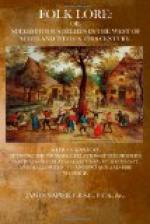“Lady bird, lady bird, fly
away home,
Your house is on fire, and
your children at home.”
or
“Lady lady landers, fly away to Flanders.”
But these practices were not altogether confined to children. Grown up girls, when they caught a lady bird, held it in their hands, and repeated the following couplet—
“Fly away east or fly away
west,
And show me where lives the
one I like best.”
Its flight was watched with great anxiety, and when it took the direction which the young girl wished, it was not only a sort of pleasure, but a proof of the augury.
If a person on going to his work, or while going an errand, were to see a hare cross the road in front of him, it was a token that ill luck would shortly befall him. Many under such circumstances would return home and not pursue their quest until the next meal had been eaten, for beyond that the evil influence did not extend. This superstition is very old, but it is not in every country or age connected with the hare. We have already seen in a quotation from Ovid that this superstition existed in his day, (page 2.) Probably the hare has been adopted in this country from the belief that witches assumed the form of that animal when on their nightly rambles, for how was the wayfarer to know that the hare which he saw was not a transformed witch, intent on working him mischief?
The cat was always a favourite in a family, and nothing was more unlucky than for one to die inside the house. I have known cases where, when such a misfortune occurred, the family were thrown into great consternation, surmising what possible form of evil this omen portended to them. Generally when a cat was known to be ailing, the animal was removed from the house and placed in the coal cellar, or other outhouse, with plenty of food, and kept there until it either recovered or died. With the ancient Egyptians the cat was one of their favourite animals. The death of a cat belonging to a family was considered a great misfortune. Upon the occurrence of such an event the household went into mourning, shaving off their eyebrows, and otherwise indicating their sorrow. In Scotland it was believed that witches often assumed the cat form while exercising their evil influence over a family.
It was pretty generally believed a few years ago that in large fires kept continually burning there was generated an animal called a salamander. It required seven years to grow and attain maturity, and if the fires were kept burning longer than that there was great danger that the animal might make its escape from its fiery matrix, and, if this should happen, it would range round the world, destroying all it came in contact with, itself almost indestructible. Hence large fires, such as those of blast furnaces in ironworks, were extinguished before the expiry of the seven years, and the embryo monster taken out. Such an idea may have had its origin in a misinterpretation




